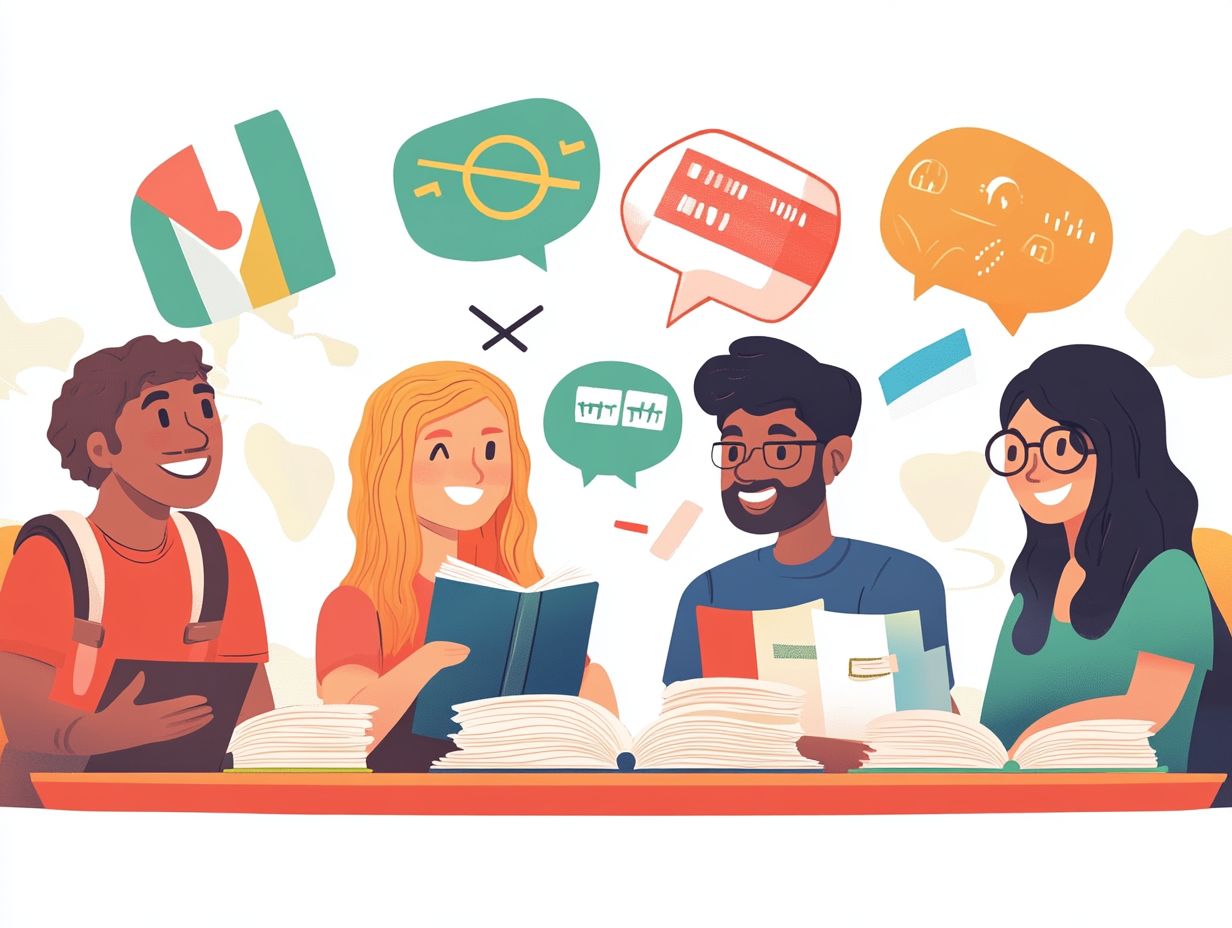5 Myths About Language Learning Debunked
Learning a new language can seem like an overwhelming endeavor, often shrouded in pervasive misconceptions.
You might think that being young, fluent, or immersed in a foreign country is necessary for language learning success. These myths can actually obstruct your progress instead of facilitating it.
This article sets the record straight by debunking five common myths about language learning and delving into the realities that can empower you. It also highlights the numerous benefits of acquiring a new language, effective strategies for mastering it, and tips to keep your motivation soaring.
Are you ready to unlock your linguistic potential?
Contents
- Key Takeaways:
- 1. You Need to Be Young to Learn a Language
- 2. You Have to Be Fluent to Be Considered Skilled
- 3. You Can Learn a Language in a Few Weeks
- 4. Only Native Speakers Can Speak a Language Perfectly
- 5. You Need to Live in a Country Where the Language Is Spoken to Become Fluent
- What Are the Benefits of Learning a New Language?
- Frequently Asked Questions
Key Takeaways:

Age is not a barrier for language learning. Anyone can learn at any age.
Fluency is not the only measure of being skilled in a language. Focus on improving communication skills.
Learning a language takes time and consistency. It is not possible to become fluent in a few weeks.
1. You Need to Be Young to Learn a Language
One of the most persistent myths about language learning is the notion that youth is a prerequisite for mastering a new language. However, research reveals that individuals of every age can successfully acquire new language skills when armed with the right techniques and resources.
Embracing the idea that your brain stays adaptable throughout your life is crucial in dispelling this myth, giving you the power to engage with language learning in diverse contexts whether through self-study, classroom experiences, or cultural exchanges with native speakers.
Cognitive skills, like memory retention and pattern recognition, evolve and adapt regardless of age. For instance, you might find that adults using language-learning apps like Duolingo or Pimsleur discover inventive ways to weave new vocabulary into their everyday lives. This shows that dedication and practice outweigh any age-related concerns.
Many successful adult learners have recounted their journeys of mastering complex languages in their 40s or 50s. This proves that effective methods, especially those involving interactive technology, can facilitate language acquisition with remarkable success.
These tools make it easier to practice regularly and provide personalized learning paths tailored to your pace, making the journey accessible and enjoyable for everyone, regardless of age.
2. You Have to Be Fluent to Be Considered Skilled
A common misconception in language learning is that you must achieve fluency to be considered skilled. In reality, being skilled means knowing vocabulary, grammar, and how to have conversations, all of which can be developed through consistent practice.
Understanding this spectrum of language skills gives you the power to set realistic goals and appreciate your progress without the pressure of attaining absolute fluency.
You might overlook the value of partial fluency, where you can engage in meaningful conversations even with a limited vocabulary. Participating in language exchange meetups or using language-learning apps can offer excellent opportunities to practice speaking with native speakers.
These interactions not only enhance your conversational skills but also boost your confidence, proving that you don t need to be completely fluent to communicate effectively.
By focusing on gradual improvements like mastering everyday phrases or grasping context you can cultivate your language competency and genuinely enjoy the journey of mastering a new language.
So, what are you waiting for? Start your language journey today!
3. You Can Learn a Language in a Few Weeks
You can’t master a new language in just a few weeks. Language learning is complex and takes time.
While intensive programs and immersive experiences might speed things up, grasping vocabulary, grammar, and conversational nuances requires a steady commitment to ongoing study.
Realistic timelines for reaching conversational fluency often range from six months to several years. Your dedication and the resources you engage with heavily influence this timeline.
Using language learning apps like Duolingo or Babbel for daily practice, along with interactions with native speakers through language exchange platforms, can greatly enhance your retention and real-world application.
Establish structured routines with focused study sessions. For example, dedicate 30 minutes each day to vocabulary building, followed by interactive listening exercises to cultivate a solid understanding.
Immersion experiences, whether through travel or local cultural events, solidify your language skills and enrich your appreciation of the culture.
4. Only Native Speakers Can Speak a Language Perfectly

It s a myth that only native speakers can speak a language perfectly. With practice, you too can communicate effectively even if you don’t reach native-like fluency.
By embracing the unique perspectives that come with language learning, you can engage in meaningful communication with native speakers.
Consider the story of a French student who, despite her accent and occasional missteps, engaged in deep conversations with her English-speaking classmates. Her enthusiasm for sharing her culture built connections, allowing her to express her thoughts clearly.
Think of a Japanese businessman who successfully negotiated a deal in English. He didn t rely on perfect speech; instead, his clear intent and genuine desire to connect made all the difference.
These examples show that language proficiency isn t just about grammatical perfection. It thrives on connection and understanding, proving that meaningful communication is the true goal.
5. You Need to Live in a Country Where the Language Is Spoken to Become Fluent
Many believe you must live in a country to learn a language. This isn’t true! Countless resources can create an enriching language-learning environment from your home.
By tapping into foreign films, podcasts, and online communities, you can effectively practice and refine your language skills without ever stepping foot outside your country.
Imagine setting up a cozy movie night with films in your target language; it not only sharpens your listening skills but immerses you in the cultural nuances and slang that textbooks often overlook.
Engaging with language exchange partners online through platforms like Skype or Tandem opens avenues for real-time conversation, allowing you to put your skills to practical use.
Involving yourself in cultural activities like cooking traditional dishes or diving into local music enriches your learning experience. Through these methods, you ll grasp not just the words, but the vibrant context surrounding them, making your language journey a more holistic adventure.
What Are the Benefits of Learning a New Language?
Learning a new language offers a wealth of benefits that go far beyond simple communication. It enhances your cognitive skills, fosters rich cultural exchanges, and opens doors for personal and professional growth, creating a truly rewarding and enriching experience. From boosting your memory and critical thinking to expanding your career prospects and elevating your travel adventures, the advantages of language learning are both vast and impactful.
Research highlights that mastering a new language can significantly sharpen your problem-solving skills, allowing you to approach challenges with a fresh perspective. Bilingual individuals often excel at multitasking. Their brains become skilled at switching between different languages and contexts, enhancing their ability to focus on relevant information while filtering out distractions.
Testimonials from researchers indicate that being multilingual can improve your critical thinking abilities, enabling you to analyze situations with greater effectiveness. Studies show that learning another language can delay the onset of age-related cognitive decline, providing lifelong benefits that extend well into your golden years.
What Are the Most Effective Ways to Learn a Language?
Exploring the most effective ways to learn a language involves a rich tapestry of techniques and resources tailored to your unique learning style. Whether it s through immersive experiences, structured courses, or the convenience of apps and online platforms, the options are plentiful.
You can significantly elevate your learning journey by integrating diverse methods. Consider talking to native speakers, tackling vocabulary exercises, and immersing yourself in foreign films or podcasts.
Immersive learning through travel or connecting with native speakers in your community helps you contextualize vocabulary and phrases in real-life situations. Language learning apps like Duolingo or Mango provide structured lessons that effortlessly fit into your daily routine, offering the flexibility you need.
Traditional study methods, such as using flashcards or textbooks, can complement these dynamic techniques by reinforcing grammar rules and solidifying foundational knowledge. With just a few minutes dedicated each day to these varied resources, you can adopt a balanced approach that nurtures deeper understanding and enhances retention.
What Are the Common Obstacles to Language Learning?

Language learners frequently encounter common obstacles that can hinder their progress, such as the fear of making mistakes, time constraints, and common misconceptions that create mental blocks. Recognizing these challenges is essential for crafting strategies to overcome them and nurturing a more positive learning experience.
One significant hurdle you may face is the anxiety tied to speaking a new language, often fueled by a fear of judgment or embarrassment. This emotional aspect can deter you from engaging in conversations, further stalling your ability to communicate effectively.
Time constraints can lead to hurried study sessions that lack depth, ultimately affecting your retention and fluency. To combat these issues, it’s important to cultivate a supportive environment and implement structured practice routines that emphasize gradual exposure, allowing you to build confidence over time.
You can also use techniques such as positive self-talk and mindfulness, helping you shift your focus from fear to growth. This way, you can transform challenges into stepping stones on your language-learning journey.
Start practicing today! Don t let fear hold you back; take the first step now!
How Can One Stay Motivated While Learning a Language?
Maintaining motivation while learning a language is essential for your success. You can achieve this through various strategies that enhance both engagement and enjoyment in your journey.
Setting achievable goals and celebrating those small victories will keep the experience fresh and thrilling. Integrating enjoyable activities like watching foreign films or listening to podcasts into your study routine can make a big difference.
Why not create a vision board? It can inspire you every day by showcasing your language goals, turning the abstract into something tangible. Scheduling regular checkpoints to assess your progress provides a sense of accomplishment that fuels your motivation even more.
Incorporating interactive activities, such as language exchange meetups or cooking classes featuring dishes from the cultures you’re exploring, not only enriches your vocabulary but also fosters a sense of community. This makes your learning experience all the more memorable and enjoyable.
Ultimately, these strategies will nurture your dedication and transform your language learning journey into a fulfilling adventure.
Top Resources for Learning a Language!
Selecting the best resources for your language learning journey is essential for effective study and practice. With a wealth of tools at your disposal think language learning apps, online courses, and community platforms that encourage interaction with native speakers you have everything needed to succeed.
Pimsleur, Duolingo, and Mango offer various learning techniques and structured paths that cater to your unique learning preferences. If you thrive in structured environments, platforms like Babbel and Rosetta Stone will suit you perfectly, simplifying complex grammar and vocabulary into digestible segments.
Websites like iTalki and Tandem allow you to connect with native speakers for real-time practice, making the language feel more relatable. Books such as “Fluent Forever” and “Language Hacking” provide unique insights and strategies for mastering a new language, enhancing your overall learning experience.
By combining these varied resources, you can craft a personalized learning journey that aligns with your specific goals and lifestyle.
How Can One Overcome the Fear of Making Mistakes While Speaking a New Language?
Overcoming the fear of making mistakes while speaking a new language can be a big challenge for many learners. However, embracing errors as a natural part of the language acquisition process will boost your confidence and improve your skills.
Regular practice, seeking constructive feedback, and recognizing that even native speakers stumble will empower you to communicate more freely and effectively. One effective technique is to practice in low-pressure environments, such as small gatherings with friends or language clubs, where the focus is on learning rather than perfection.
Language exchange platforms also offer a fantastic opportunity for you to connect with others who share your goals, often leading to delightful conversational exchanges.
Consider the example of Maria, a shy learner who initially found speaking daunting. After she joined a local language club, she transformed from hesitant to leading discussions, significantly boosting her confidence and fluency. Stories like hers demonstrate that with the right support and practice, you can conquer your fears and thrive in conversations.
Frequently Asked Questions

What Are Some Common Myths About Language Learning?
- You must be naturally gifted to learn a language. Some people think only gifted individuals can learn languages.
- Children learn languages better than adults.
- You need to live in a country where the language is spoken to become fluent.
- Learning multiple languages at once is too difficult.
- You need expensive programs or classes to learn a language.
Are These Myths True?
No, these are all myths and have been debunked by research and personal experiences. Anyone can learn a language with dedication and determination, regardless of age or natural ability. Living in a country where the language is spoken can enhance learning, but it is not necessary for fluency. While learning multiple languages at once may be challenging, it is not impossible.
Start today, and watch your skills soar!
Why do these myths persist?
Myths about language learning stick around because of common beliefs and misunderstandings. Some people think only certain individuals can pick up languages easily, or that adults can’t learn new languages at all.
The focus on expensive programs and immersive experiences also fuels these misconceptions.
How can these myths be harmful?
These myths can discourage many from even trying to learn a new language. They create a false belief that only a select few can succeed, leaving others feeling inadequate.
This mindset can prevent people from enjoying the advantages that come with being multilingual.
What are the benefits of debunking these myths?
Debunking these myths opens the door to language learning for everyone! It shows that anyone can learn a language, no matter their background or age. However, being aware of 5 things to avoid when learning a new language can significantly enhance your experience.
This understanding fosters appreciation for diverse cultures and languages, enriching our lives.
What are some tips for successful language learning?
Here are some tips to help you learn a language effectively:
- Set clear, achievable goals.
- Practice regularly.
- Embrace your mistakes as chances to learn.
- Immerse yourself in the language and culture.
- Choose a learning method that suits you, whether it s classes, self-study, or a mix.






